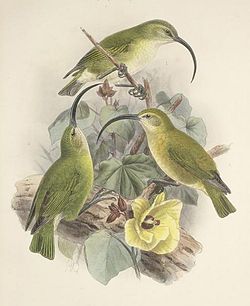- Maui Nui 'Akialoa
-
Maui Nui 'Akialoa 
Restoration Conservation status Scientific classification Kingdom: Animalia Phylum: Chordata Class: Aves Order: Passeriformes Family: Drepanididae Genus: Akialoa Species: A. lanaiensis Binomial name Akialoa lanaiensis
(Rothschild, 1893)Synonyms Hemignathus obscurus (Gmelin, 1788) pro parte
The Maui Nui 'Akialoa or Lana'i 'Akialoa (Akialoa lanaiensis) is a species of finch in the Fringillidae family. It was endemic to the island of Lanai, Hawaii in modern times, but seems to have occurred on all major islands of former Maui Nui before human settlement. The Maui Nui Akialoa was one of the birds that made up the group Akialoa. This group included the long billed birds that were from five inches to nine inches in length. What makes up to a third of their length was their bill which ranged from an inch in length, to two and a half. This species was the second largest of the Akialoas and was the most widespread. It once inhabited the islands of Lanai, Kahoolawe and Molokai but had vanished before scientists could see them alive on these islands. It was a greyish-yellow bird that was found at mid altitude areas where it was seen pecking on bark in search or insects and seen pecking at flowers in search of nectar. The bird was six inches long, with a bill that was an inch and a half in length. It was a bird that was very fragile in nature and elusive. It was never found in high numbers and may have been on the verge of extinction on Maui just when the Europeans. The loss of the understory layer to pigs was a big hit to the last of the birds. If the land was cleared by pigs the land would have a forest floor layer made up of durable, pig resistant plant the Akialoa was not accompanied to. By the year of 1892, this Akialoa was gone, and would be the first of four species of Akialoa to disappear from the Earth.It became extinct due to habitat loss and introduced diseases.
Notes
References
- BirdLife International 2004. Akialoa lanaiensis. 2006 IUCN Red List of Threatened Species. Downloaded on 10 July 2007.

This Fringillidae-related article is a stub. You can help Wikipedia by expanding it.

